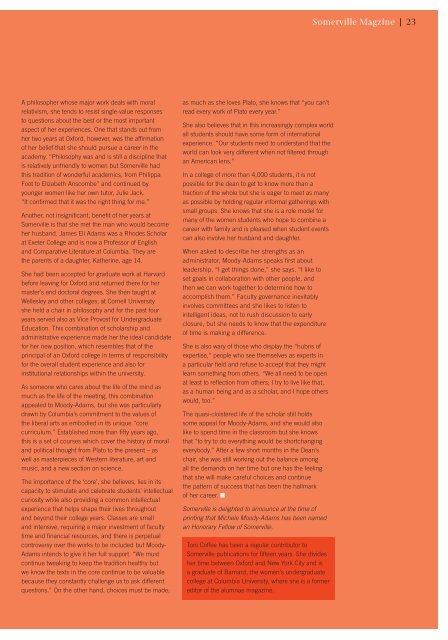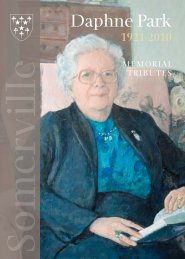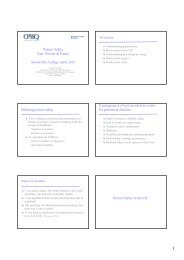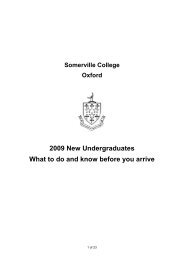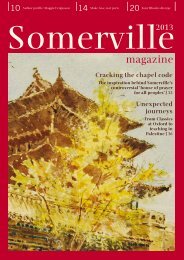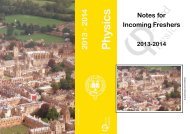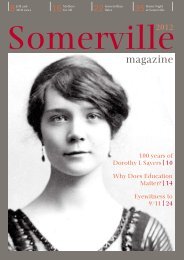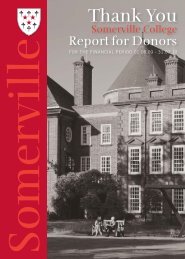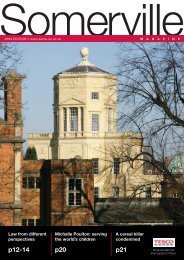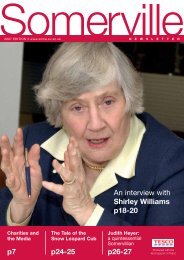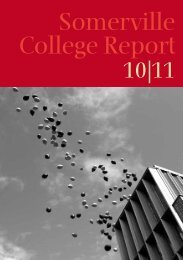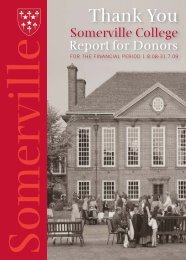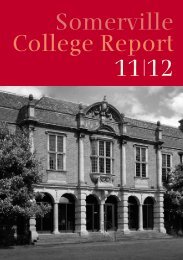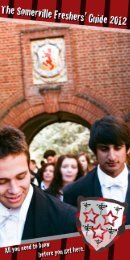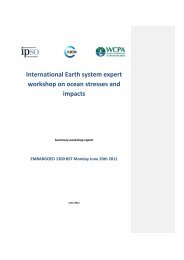magazine - Somerville College - University of Oxford
magazine - Somerville College - University of Oxford
magazine - Somerville College - University of Oxford
You also want an ePaper? Increase the reach of your titles
YUMPU automatically turns print PDFs into web optimized ePapers that Google loves.
<strong>Somerville</strong> Magzine | 23<br />
A philosopher whose major work deals with moral<br />
relativism, she tends to resist single-value responses<br />
to questions about the best or the most important<br />
aspect <strong>of</strong> her experiences. One that stands out from<br />
her two years at <strong>Oxford</strong>, however, was the affi rmation<br />
<strong>of</strong> her belief that she should pursue a career in the<br />
academy. “Philosophy was and is still a discipline that<br />
is relatively unfriendly to women but <strong>Somerville</strong> had<br />
this tradition <strong>of</strong> wonderful academics, from Philippa<br />
Foot to Elizabeth Anscombe” and continued by<br />
younger women like her own tutor, Julie Jack.<br />
“It confi rmed that it was the right thing for me.”<br />
Another, not insignifi cant, benefi t <strong>of</strong> her years at<br />
<strong>Somerville</strong> is that she met the man who would become<br />
her husband. James Eli Adams was a Rhodes Scholar<br />
at Exeter <strong>College</strong> and is now a Pr<strong>of</strong>essor <strong>of</strong> English<br />
and Comparative Literature at Columbia. They are<br />
the parents <strong>of</strong> a daughter, Katherine, age 14.<br />
She had been accepted for graduate work at Harvard<br />
before leaving for <strong>Oxford</strong> and returned there for her<br />
master’s and doctoral degrees. She then taught at<br />
Wellesley and other colleges; at Cornell <strong>University</strong><br />
she held a chair in philosophy and for the past four<br />
years served also as Vice Provost for Undergraduate<br />
Education. This combination <strong>of</strong> scholarship and<br />
administrative experience made her the ideal candidate<br />
for her new position, which resembles that <strong>of</strong> the<br />
principal <strong>of</strong> an <strong>Oxford</strong> college in terms <strong>of</strong> responsibility<br />
for the overall student experience and also for<br />
institutional relationships within the university.<br />
As someone who cares about the life <strong>of</strong> the mind as<br />
much as the life <strong>of</strong> the meeting, this combination<br />
appealed to Moody-Adams, but she was particularly<br />
drawn by Columbia’s commitment to the values <strong>of</strong><br />
the liberal arts as embodied in its unique “core<br />
curriculum.” Established more than fi fty years ago,<br />
this is a set <strong>of</strong> courses which cover the history <strong>of</strong> moral<br />
and political thought from Plato to the present – as<br />
well as masterpieces <strong>of</strong> Western literature, art and<br />
music, and a new section on science.<br />
The importance <strong>of</strong> the ‘core’, she believes, lies in its<br />
capacity to stimulate and celebrate students’ intellectual<br />
curiosity while also providing a common intellectual<br />
experience that helps shape their lives throughout<br />
and beyond their college years. Classes are small<br />
and intensive, requiring a major investment <strong>of</strong> faculty<br />
time and fi nancial resources, and there is perpetual<br />
controversy over the works to be included but Moody-<br />
Adams intends to give it her full support. “We must<br />
continue tweaking to keep the tradition healthy but<br />
we know the texts in the core continue to be valuable<br />
because they constantly challenge us to ask different<br />
questions.” On the other hand, choices must be made;<br />
as much as she loves Plato, she knows that “you can’t<br />
read every work <strong>of</strong> Plato every year.”<br />
She also believes that in this increasingly complex world<br />
all students should have some form <strong>of</strong> international<br />
experience. “Our students need to understand that the<br />
world can look very different when not fi ltered through<br />
an American lens.”<br />
In a college <strong>of</strong> more than 4,000 students, it is not<br />
possible for the dean to get to know more than a<br />
fraction <strong>of</strong> the whole but she is eager to meet as many<br />
as possible by holding regular informal gatherings with<br />
small groups. She knows that she is a role model for<br />
many <strong>of</strong> the women students who hope to combine a<br />
career with family and is pleased when student events<br />
can also involve her husband and daughter.<br />
When asked to describe her strengths as an<br />
administrator, Moody-Adams speaks fi rst about<br />
leadership. “I get things done,” she says. “I like to<br />
set goals in collaboration with other people, and<br />
then we can work together to determine how to<br />
accomplish them.” Faculty governance inevitably<br />
involves committees and she likes to listen to<br />
intelligent ideas, not to rush discussion to early<br />
closure, but she needs to know that the expenditure<br />
<strong>of</strong> time is making a difference.<br />
She is also wary <strong>of</strong> those who display the “hubris <strong>of</strong><br />
expertise,” people who see themselves as experts in<br />
a particular fi eld and refuse to accept that they might<br />
learn something from others. “We all need to be open<br />
at least to refl ection from others; I try to live like that,<br />
as a human being and as a scholar, and I hope others<br />
would, too.”<br />
The quasi-cloistered life <strong>of</strong> the scholar still holds<br />
some appeal for Moody-Adams, and she would also<br />
like to spend time in the classroom but she knows<br />
that “to try to do everything would be shortchanging<br />
everybody.” After a few short months in the Dean’s<br />
chair, she was still working out the balance among<br />
all the demands on her time but one has the feeling<br />
that she will make careful choices and continue<br />
the pattern <strong>of</strong> success that has been the hallmark<br />
<strong>of</strong> her career. ■<br />
<strong>Somerville</strong> is delighted to announce at the time <strong>of</strong><br />
printing that Michele Moody-Adams has been named<br />
an Honorary Fellow <strong>of</strong> <strong>Somerville</strong>.<br />
Toni C<strong>of</strong>fee has been a regular contributor to<br />
<strong>Somerville</strong> publications for fi fteen years. She divides<br />
her time between <strong>Oxford</strong> and New York City and is<br />
a graduate <strong>of</strong> Barnard, the women’s undergraduate<br />
college at Columbia <strong>University</strong>, where she is a former<br />
editor <strong>of</strong> the alumnae <strong>magazine</strong>.


